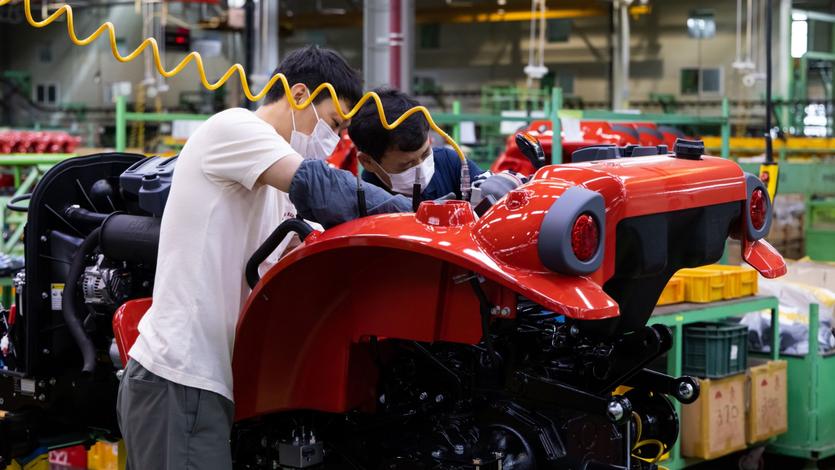 In this undated file photo, employees assemble a tractor on the production line at the TYM Corp factory in Iksan, South Korea. (SEONGJOON CHO / BLOOMBERG)
In this undated file photo, employees assemble a tractor on the production line at the TYM Corp factory in Iksan, South Korea. (SEONGJOON CHO / BLOOMBERG)
TOKYO - Asia's factories struggled for momentum in July as flagging global demand slowed production, although early signs red-hot inflation may be peaking provided some optimism for firms squeezed by prices.
A series of purchasing managers' indexes (PMI) for July released on Monday showed new orders falling in the region's manufacturing powerhouses, particularly tech giants in northeast Asia.
A surge in global commodity prices amid supply chain disruptions caused by the pandemic and the Ukraine crisis has become a nightmare scenario for businesses and policymakers worldwide, with central banks rushing to tighten monetary policy and firms cutting costs
South Korea's factory activity fell for the first time in almost two years while Japan saw its slowest growth in activity in 10 months amid persistent supply chain disruptions.
The PMIs for Asia's largest manufacturing economies highlighted the struggle for factories in those countries in dealing with the twin pressures of higher upstream prices and weakening demand.
ALSO READ: Global slowdown fears darken prospects for Asian factories
"Higher prices for inputs including fuel, metals and semiconductors meant that the disruption was broad-based across the (South Korean) manufacturing sector," Usamah Bhatti, economist at S&P Global Market Intelligence, said of South Korea's PMI.
"That said, the rate of input price inflation eased to a four-month low in a tentative sign that price pressures had peaked, although cost inflation remained well above the long-term average."
Adding to that gloom, the PMI for Taiwan region, a major producer of high-end technology components, showed factory activity falling at its sharpest pace since May 2020.
Silver lining?
A surge in global commodity prices amid supply chain disruptions caused by the pandemic and the Ukraine crisis has become a nightmare scenario for businesses and policymakers worldwide, with central banks rushing to tighten monetary policy and firms cutting costs.
There was some positive news, however, with PMIs indicating input price growth slowing in Taiwan region, India and South Korea.
Conditions in parts of Southeast Asia were also upbeat, with PMIs pointing to a pickup in activity growth in Indonesia, Malaysia and Thailand where new orders growth bucked declines seen elsewhere in the region.
India's factory activity expanded at its quickest pace in eight months in July, also helped by solid growth in new orders and output and a sign the South Asian economy remains resilient.
South Korea's exports grew at a faster annual pace in July amid robust demand from the United States, separate trade data showed on Monday.
READ MORE: Asia's factories recovering as restrictions ease after Delta hit
Asia's readings come ahead of factory surveys due out of the UK, euro zone and United States later in the day, which are expected to show similarly mixed conditions in the world's major industrialized economies.


